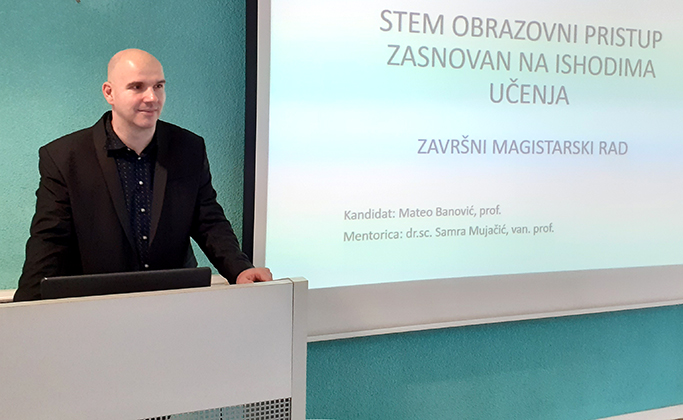 North West Balkans
North West Balkans
Languages
Teachers shaping the education reform in BiH

The success of any reform is conditioned by how stimulating it will be to the people who are part of that system. The engaged individuals from the profession are crucial in identifying real obstacles and finding more effective solutions. Thus, Mateo Banović, a teacher of computer science and technical culture at the Bijela Primary School, Brčko District, decided to explore the STEM educational approach based on learning outcomes more thoroughly, and in February 2020 successfully defended his master's thesis on this topic.
The paper presents the results of two research projects - one involving students who achieved good results at international and national competitions, and the other is a comparison of the attitudes of teachers / professors of computer science and technical culture with those of teachers / professors of mathematics, physics, chemistry, biology and geography, which without any statistically significant difference indicate the shortcomings of the existing education system.
We talked with Banović about his motivation, attitudes and recommendations, and you can read his answers below.
What motivated you to choose this topic for your master's thesis?
The greatest motivation is the possibility of educational reform that would enable the study of subjects of Computer Science and Technical Culture in a way that classes follow the latest trends in these fields and greater real correlation with other subject areas, all for the purpose of acquiring functional knowledge and skills. The ENABLE BiH project, STEM educational approach introduces a curricular approach that, in addition to focusing the teaching process on students, their aspirations to acquire competencies and their qualifications for the time in which they live and professions of the future, it gives teachers and professors the opportunity to follow the latest trends in their professional fields, incorporating them into the teaching process, which is very important for the aforementioned subjects because the changes in the area are intense, happen every day, and in order for them to be dealt with, they must be followed.
According to your research and experience, how would you describe today's education system in BiH?
The education system in BiH is somehow frozen in time. Many things have remained the same as in the previous system, the principles of which are not based on qualifications, initiative, combating competition, to be more precise. In many places, everything is based on theory that does not envisage functional knowledge applicable in practice. The research I did in my final master's thesis in a way identifies the shortcomings of the existing education system and provides guidance on how a STEM educational approach based on learning outcomes, with the necessary adaptation and modification, could solve them through its implementation.
Does the current system prepare children for the job market in their future?
I have already mentioned that in the IT industry, generally in technology, the progress is so intense and widespread that it is difficult to keep track of everything. This progress also causes the emergence of new professions that emerge as its consequence. All this tells us that education must be concise, focused on key principles. The modern man must be ready for constant changes, accept models for the easiest way to adapt to them, with the obligatory need for lifelong learning. The current education system often does not profile young people who cannot manage in this time, not to speak of the future.
What does the term "knowledge-based economy" mean to you?
Knowledge is the greatest and most valuable resource. The only resource that increases by its sharing. To base the economy on knowledge in some way is a guarantee of the independence of every society, because all other resources are limited, more or less available and often have certain negative effects.
How was your work influenced by the ENABLE BiH project?
The ENABLE BiH project was the biggest driver for choosing this topic. I am intensely involved in its realization, where I see firsthand its capabilities, but also the inevitable resistance that must emerge because they are a natural consequence and an obligatory part of any educational reform. A new educational paradigm that is making a major shift from a content-based education system to a STEM approach based on learning outcomes is a comprehensive, reform-intensive and precisely gradual transition based on experiences from model schools where shortcomings are identified based on experience, seeking solutions to them and more suitable models for real application.
How will you use your acquired knowledge and experience in the future?
I feel best on some tried and tested experience field. So the research work is mostly experiential, and therefore deals with real difficulties and problems. This area offers a huge space for work, where I am most interested in local factors, local mindset, adaptation of models to our man's habits and traits. So surely my engagement in the future will also be directed towards real implementation difficulties. The success of any reform is conditioned by how motivating it will be to the people who are part of that system. The research papers, books, textbooks, etc. created by engaged individuals who are part of that system, and resulting from the motivation for changes that came in this case with the implementation of the ENABLE BiH and similar projects, indicate those real implementation difficulties and offer possible solutions.
---
Banovic actively participated in the professional trainings held as part of the implementation of the Enhancing and Advancing Basic Learning and Education in Bosnia and Herzegovina (ENABLE BiH) project, supported by the USAID BiH. He is also coordinator of project activities in Gymnasium Vaso Pelagić Brčko, one of the 12 primary and high schools in BiH equipped with a modern STEM lab through the Project. He teaches informatics and technical culture at the Bijela Primary School, Brcko District, which in November 2019 won the 2nd place for the presented STEM project at the STEM fair organized as part of the ENABLE BiH project.